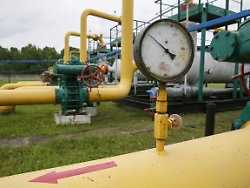An interview with the Naftogaz board
“Germany should at least stop Nord Stream 1”
By Max Borowski
03/14/2022, 5:30 p.m
Anyone who doesn’t want to be “shared responsibility” for the suffering in Ukraine shouldn’t buy Russian gas, says Mavrikiy Kalugin. The Ukrainian group, on whose board he sits, forwards part of this gas to Europe itself. His employees are trying to maintain the supply in the country at the risk of their lives.
The state-owned Ukrainian oil and gas company Naftogaz is calling on Germans and Europeans to stop buying Russian gas from their own pipelines. The expected drastic price increases “we should be willing to pay so that we don’t share responsibility for the human suffering caused by Putin’s war,” said Mavrikiy Kalugin, the Naftogaz board member responsible for operations, ntv.de. The price for energy is offset by a “price for freedom and humanity”. Naftogaz has continued to send Russian gas to Europe through its pipelines in Ukraine for the past two weeks, despite the Russian invasion. At the same time, the company buys gas for Ukrainian companies and consumers on the European market. The war-torn country is also directly affected by the rise in energy prices.
In an interview with ntv.de, Kalugin made it clear that Naftogaz itself would not stop gas transport from Russia to the EU. “We are a reliable company,” said Kalugin. “That decision is up to our customers.” The manager called it “contradictory” and “strange” that these European customers were demonstrating such impressive solidarity with the invaded Ukraine, while also transferring hundreds of millions of euros a day to Russia to import gas, which the ruler Vladimir Putin uses to finance “his war against civilians.”
Kalugin named two alternatives if the Europeans were not prepared to stop imports. On the one hand, the payment for the Russian gas could be transferred to an escrow account. “It would only be paid out if Putin stopped his attack.” Or: “Germany should at least stop the Nord Stream 1 gas pipeline,” demanded Kalugin. Nord Stream 1 transports gas through the Baltic Sea around Ukraine as a transit country. Closing this German-Russian direct line would force Russia to route almost all of its gas through Ukraine, where there is sufficient pipeline capacity. “That would be a kind of insurance for us.” Russian troops could thus be forced to avoid attacks on this important part of Ukraine’s infrastructure or even halt their invasion altogether.
“A Matter of Survival”
Naftogaz facilities have repeatedly been the target of Russian rocket attacks, Kalugin reported. Several colleagues had already been killed on the first day of the war. In particular, oil and gas production sites were attacked. “We’re still trying to keep production going as much as possible,” reports Kalugin. For many Ukrainians this is “a question of survival”. Because the country is largely geared towards gas as an energy source for the economy as well as for private consumers. “Without gas, people can neither heat nor cook,” says Kalugin.
So far, Naftogaz has largely maintained gas production and secured supplies for most parts of the country, Kalugin said. “No one knows if we can still do it tomorrow. But the front is getting closer and closer to the gas production facilities in the east.” The employees worked in great danger under the most difficult conditions to maintain the gas supply. Above all, there is a lack of protective equipment, helmets and even food rations.
Gas production is also threatened by a lack of methanol, said Kalugin. Before the war, Naftogaz bought most of the gas needed for natural gas production in Russia. Kalugin reported that it was only with great difficulty that he found alternative providers in other countries. However, transporting the gas in trains or trucks to the production sites in eastern Ukraine is the greatest challenge.
Kalugin welcomed plans from Germany and the EU to completely dispense with Russian natural gas – and thus with the services of Naftogaz as a transit pipeline operator – in the long term. In the long term, Ukraine could transform itself from a transit country into an energy supplier. Among other things, large gas reserves were slumbering under the Dniepr-Donetsk basin. However, further investigations, investments worth billions and several years of work are necessary before Ukraine becomes a gas exporter. In the long term, Naftogaz wants to become a supplier of green hydrogen, i.e. hydrogen obtained from renewable energy, explained Kalugin. The Ukraine can use its large, partly sparsely populated area for wind turbines in particular. Naftogaz recently concluded an agreement for an initial pilot project with the German energy group RWE.
